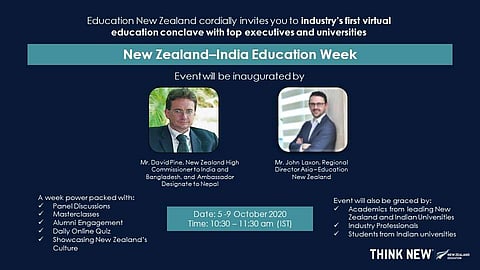

Blended learning is here to stay whether it is in India, New Zealand or elsewhere. We are trying to keep students at the centre and build a course or experience around it, said John Laxon, Regional Director-Asia, Education New Zealand during the first day of their academic conclave, which is a part of the first-ever virtually conducted New Zealand-India Education Week. "Our immediate challenge after the pandemic hit was to engage through online and digital learning, especially to international students a lot of who were back home in another country. Our aim is to partner locally as much as possible and bring in both the physical and personal element in the education experience," added John.
The event was inaugurated by David Pine, New Zealand High Commissioner to India and Bangladesh, who said New Zealand sees India as a long-term partner in the education sector. "We want partners who will take a long-term view, stick to their international commitments and I think India too sees us in the same light. Once we get through this challenging period, we have an exciting future. Initially, it was an unsettling time for students but COVID taught us that we can come up with solutions and answers very quickly," he added.
Laxon added that the year 2019 has seen a 37 per cent increase in the number of Indian students pursuing their higher education in New Zealand. As a part of efforts to strengthen the educational relations with India, New Zealand will establish a dedicated centre in the Indian Institute of Technology Delhi. "We will also focus on rankings workshops for Indian universities led by the University of Auckland. A lot of things and our ways of dealing with things have changed with the pandemic, but the focus is to rebuild and renew these relationships and partnerships. We are also planning on having exchange programmes, joint PhD programmes in Indian universities to help students get the NZ experience too. We will have online masterclasses by New Zealand universities and are also planning on partnering with EdTech platforms to make the process of online teaching and learning seamless," he added.
Speaking on how EdTech is a game-changer during such times of crisis, John added that higher education institutes should try to partner with such platforms to provide dynamic student solutions in the education sector. "These platforms already have registered several million users during the pandemic, they have smart solutions and are continuously expanding. That is one positive takeaway from the COVID-19 pandemic. We can now provide solutions to students at high speed. Distance/correspondence learning was already there but when technology came into the picture and EdTech came in, accessibility has increased multiple folds. The demography earlier was quite different, now it has changed, the age bracket is much younger and not gender-specific. Thus we would like to keep investing in these platforms, supporting Indian students, even if not in person right now, but this relationship will continue," he said.
Finally, he said that the New Zealand government has already taken measures for international students and education owing to the pandemic. "We already had a dedicated student portal that was set up, COVID-19 wage subsidy is being provided, healthcare, insurance, employment and extended visa facilities are being provided to international students. And a student Hardship Fund of one million dollars was also set up by the government for immediate relief. We have a recovery plan in the works and are ready to welcome students to New Zealand again. We are trying to innovate and create more pathways, increase digital an online learning capabilities to facilitate the higher education of Indian and international students," he concluded.
